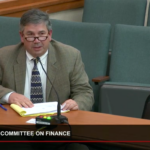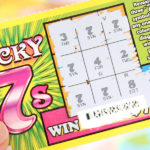Representatives of Texas Baptists’ Christian Life Commission and Texans Against Gambling recently called on members of the Sunset Advisory Commission to take a hard look at the Texas Lottery Commission.
Katie Frugé and John Litzler of the CLC submitted a detailed 10-page letter—along with 47 pages of supporting documentation—to the Sunset Advisory Commission in advance of its upcoming review of the Texas Lottery Commission.
Litzler and Rob Kohler, longtime consultant with the CLC on gambling issues, also met with Sunset Advisory Commission staff to discuss their concerns privately. Public hearings will be scheduled later.
‘Blatantly deceptive act’
In their letter, CLC leaders pointed to a series of actions that “call into question the integrity, security, honesty and fairness of the Texas Lottery” and its executive leadership.
“The CLC has great concern and believes Sunset staff should carefully review recent rulemaking activities of the Texas Lottery,” the letter states.
In 2005 and 2009, the Texas Lottery proposed changes to instant scratch games rules that would have opened the door to an electronic version of the lottery. The proposed changes were rejected in rulemaking proceedings due to public opposition both times.
However, in what CLC leaders termed “a blatantly deceptive act,” the Texas Lottery approved similar changes during a June 11, 2020, meeting conducted by Zoom “during the height of COVID.”
“As a direct result of these changes, the CLC has recently learned that Lotto.com is now selling multiple $100, electronic instant Texas Lottery scratch tickets,” the letter states.
During the June 2020 Zoom meeting, the Texas Lottery Commission changed its rules to allow lottery ticket sales by phone via the internet using third-party companies, rather than appearing in person at a licensed retailer for a face-to-face transaction.
Sign up for our weekly edition and get all our headlines in your inbox on Thursdays
“The CLC in the strongest of terms objects to these actions by the Texas Lottery and hope the Sunset staff will look for meaningful solutions to prevent such fraudulent action against the citizens of this State in the future.”
Response from the Texas Lottery
When contacted by the Baptist Standard for comment, Steve Helm, media relations division director for the Texas Lottery Commissions responded: “The Sunset Advisory Commission Staff Report on the Texas Lottery Commission is anticipated to be issued in the near future. At that appropriate time and as part of the Sunset review process the agency will provide responses to the Staff Report and will participate in the Sunset Advisory Commission’s public hearings.
“Feedback provided to the Sunset Advisory Commission by the public is confidential and will not be shared with the agency. However, the rulemaking proposed in June 2020 did not substantively change the requirement that all elements of a sale of a lottery ticket must take place in person at the retailer location.”
In its letter to the Sunset Advisory Commission, the CLC asserts the Texas Lottery skirts that requirement by distinguishing between actually playing the lottery by directly purchasing a ticket from a licensed retailer and “placing a play” with a lottery courier gambling company.
The letter quotes testimony by the executive director of the Texas Lottery at a House committee hearing describing the role of lottery couriers as “the Uber Eats of the lottery industry.”
‘Indefensible’ abdication of responsibility
CLC leaders assert the Texas Lottery is permitting internet gambling companies—some of which operate offshore—to sell Texas Lottery tickets from licensed retailers via phone apps and computers. The Texas Lottery also has allowed the internet companies to promote sales using its trademarked game logos on their platforms.
The Texas Lottery has claimed these “lottery couriers” operate outside their jurisdiction, and “they are helpless to stop internet gambling companies,” the letter states. However, the CLC insisted Texas is the only state lottery that has taken such a position.
“The Texas Lottery has been silent while these companies have been advertising on radio, social media platforms and in newspapers, and misleading Texans to believe that purchasing Texas Lottery tickets over telephones and computers via the internet is legal,” the letter states.
CLC leaders also pointed to the Texas Lottery’s legal obligation to adopt rules that prohibit the sale of lottery tickets to minors—a responsibility it cannot fulfill when tickets are sold by third-party companies by phone.
“The Texas Lottery’s abdication of the enforcement of this statutory requirement to unregulated ‘third party’ offshore and internet gambling companies is indefensible,” the letter from CLC leaders states.
Sunsetting Texas Lottery would be ‘a net gain’
Russ Coleman, chair of Texans Against Gambling, likewise wrote to the Sunset Advisory Commission. He called the Texas Lottery rule changes “disingenuous—and sly is not too strong a word.”
“The Texas Lottery Commission should be sunsetted,” Coleman states.
While the Texas Lottery was promoted to Texas voters in 1991 as a way to fund public education, he noted net revenue from lottery ticket sales defray the cost of only five days of the 180-day Texas public school year.
“The lottery preys on poor and vulnerable Texans. The first obligation of the state is to provide for Texans protection and well-being. The lottery, through its myriad indirect social costs and blight, does the opposite,” Coleman’s letter states.
“The lottery’s net revenue contributed to the state treasury is estimated to be one-third to one-fifth of the costs to Texans through resultant increased crime, increased law enforcement needs, and many other social services costs. … Sunsetting the Texas Lottery would be a net gain to the state treasury and Texans’ well-being.”















We seek to connect God’s story and God’s people around the world. To learn more about God’s story, click here.
Send comments and feedback to Eric Black, our editor. For comments to be published, please specify “letter to the editor.” Maximum length for publication is 300 words.